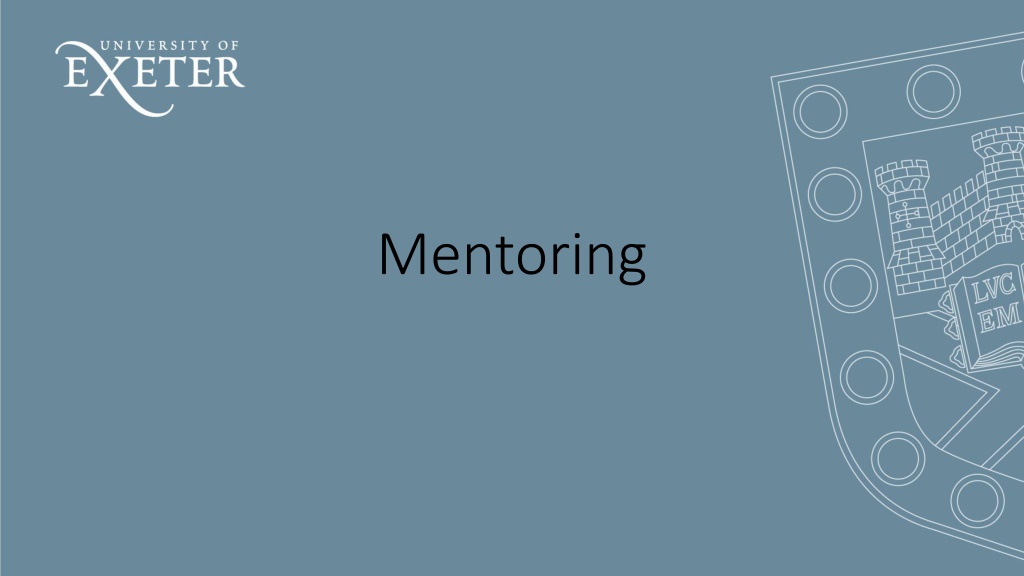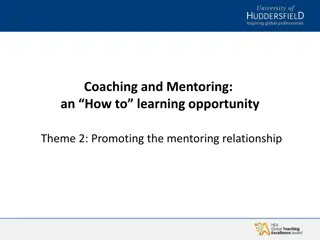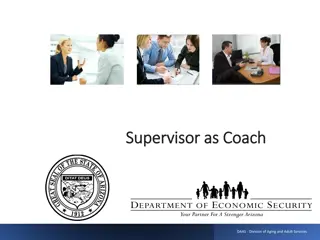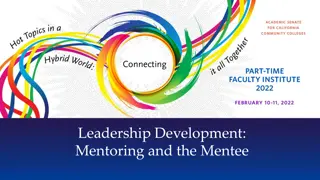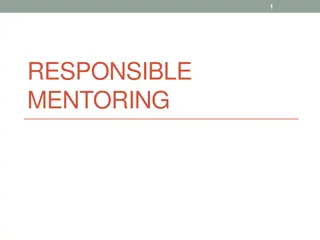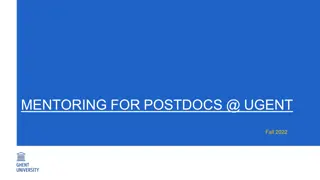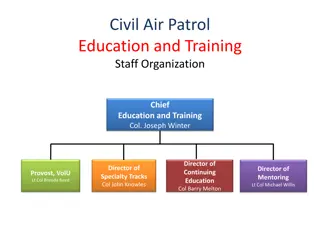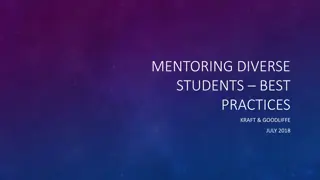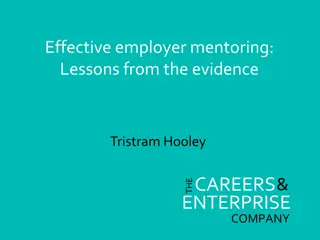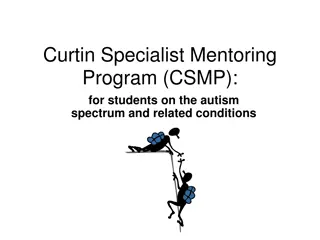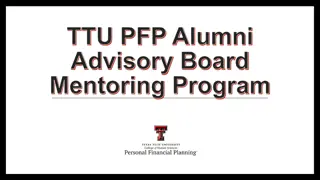Understanding the Nuances of Mentoring Relationships
Mentoring is a complex and evolving concept, with diverse definitions and practices. Literature reveals that mentoring roles vary, ranging from supervisor to supporter and collaborator. The mentoring cycle involves phases like initiation, cultivation, separation, and redefinition, emphasizing the developmental and relational aspects. Understanding these phases is crucial for both mentors and mentees in navigating the mentoring relationship effectively.
Download Presentation

Please find below an Image/Link to download the presentation.
The content on the website is provided AS IS for your information and personal use only. It may not be sold, licensed, or shared on other websites without obtaining consent from the author. Download presentation by click this link. If you encounter any issues during the download, it is possible that the publisher has removed the file from their server.
E N D
Presentation Transcript
List the characteristics of a good mentor. Which 3 are the most critical?
Its not surprising that we have quite a range. Mentoring is not an easy thing to define or even agree on what good practice looks like generally. It s a very human experience and we inevitably bring out own beliefs, values and personality into considering it.
So, what does the literature say? The word mentor has become synonymous with teacher, counsellor, coach, facilitator, motivator and friend. Typically, a mentor is described as a person who offers support and guidance to another; an experienced and trusted counsellor or friend; a patron, a sponsor . There are many interpretations of mentor roles, by researchers, teacher educators and mentors, described in the literature. As a consequence, and despite the plethora of models in literature, the concept of mentoring remains elusive (Roberts, 2000).
In the mentoring literature reviewed by Mullen &, Klimaitis (2019), they note that many definitions of mentoring exist, and that these definitions, like its practices, are changing as well as expanding. Indeed, competing definitions of mentoring have been advanced; over a decade ago, it was found that the definitions reflected ill defined roles for mentors and mentees, and unclear expectations . What might be meant by mentoring therefore, is contested, and in the context of teacher education, may reflect a number of different (and often competing) models such as mentor as: a) supervisor, b) supporter and/or c) collaborator (Kemmis et al. 2014). Broad agreement, however, is that mentoring is relational and developmental, has career (instrumental) and psychosocial (relational) functions, and includes phases and transitions, (Kochan, 2017)
Much of the research* notes that expectations and circumstances (personal and professional) change, and therefore transition is integral to the mentoring cycle. The developmental mentoring relationship's phases are initiation, cultivation, separation, and redefinition. Initiation involves engaging in sufficient interaction to assess the possibility of a productive mentee mentor match. Cultivation, the most intensive and sustained phase, is where mentoring functions (career and psychosocial) are performed, and mentor and mentee engagement peaks. During separation, the nature and intensity of the relationship shifts, with significant role alterations; a structural and psychological change occurs such that interactions decrease as the mentee's autonomy increases. In redefinition, the relationship has either run its course or shifted into collegial friendship, characterized by a peer bond, informal contact, and mutual support *Furlong and Maynard 1993; Kram, 1983; Mullen, 2012; Fletcher and Mullen, 2017; Clutterbuck, Kochan and Lunsford et al, 2017; Mullen &, Klimaitis, 2019
Towards reaching a definition of mentoring, additional specifics are: Guidance is sought or extended for purposes that vary in these interpersonal relationships Long term and intense, mentoring is a close, meaningful relationship that is formal or informal and occurs in academic or professional contexts. A goal oriented, results driven intervention at the level of relationships, mentoring assumes one or more configurations between or among individuals (such as dyadic and group peer mentoring). It is recognized that trust, values, respect, empathy, and control are all essential to mentoring, in addition to a feeling of belonging and connectedness, and that relationships are unique. Relational mentoring processes involve nurturing, advising, befriending, and instructing, with mentors serving as advocates, advisors, and promoters.
With all that said, what is important in this context is that we have consistency, and a clear idea of what mentoring should look like in the Exeter Model.
The model is firmly rooted in principles derived from sociocultural theories of learning. These are that learning to teach requires: Activity situated within the school context ( Community of Practice see Lave and Wenger, 1991) Opportunities for dialogue with others, particularly those more experienced (see Vygotsky, 1978) Scaffolded progress towards independent practice (see Bruner, 1978) Tools to make sense of the knowledge, skills and social and political contexts of teaching (see Engestr m, 1999) Deliberately reflective thinking about teaching and learning, strengthened through engagement in classroom research. Understanding that contradictions (eg between theory and current practice or between a teachers' view and a trainees' expectations) are stimuli for exploration of why these differences occur and for new thinking and practice. They are points of creative growth for individuals and ultimately for the system.
The fundamental aim of initial teacher education (ITE) at the University of Exeter is to develop effective, reflective, enquiring and transformative practitioners who prepare their students to take a full part in a changing, pluralist and democratic society. Mentoring is seen as playing a prominent role in the development of highly effective teachers
It is probably fair to see that all three of the mentoring models outlined above (supervisor; supporter; and collaborator) may be found within the Exeter Model of ITE as this approach consciously implements a number of different mentoring roles. Essentially, we believe that an effective mentor is one who facilitates their mentee s process of review, reflection and envisaging using careful questioning and probing. Their goal is to help the mentee to become aware of and explore alternative perspectives and possibilities so that they can develop a deeper understanding of their own professional identity; professional knowledge ; and students learning
Mentoring Roles in the Exeter Model Crow (2012) suggests that there are dangers in constructing forms of mentorship that lack boundaries and confuse what mentoring is (and is not). He suggests that being a practicing mentor can seem boundaryless owing to the multiple support roles assigned to it: guide, advisor, teacher, coach, role model, sponsor, support, counsellor, and even friend. Without role boundaries in mentoring, the mentor mentee relationship, as conceived, is unmanageable, incoherent and inconsistent. Even within highly fluid relationships, some boundaries should be set, such as around timelines to follow and activities with learning value. Owing to such dynamics, mentoring definitions inherit the confusion in mentor mentee roles and vague expectations. In order to alleviate these issues, there are two separate mentoring roles within the Exeter Model with specific boundaries, both focus on developing different areas of practice. These are the Lead Mentor and the Reflective Mentor.
The Lead Mentor In the classical sense, mentoring pairs a senior and junior colleague (i.e., mentoring dyad) in a support based intense relationship that guides mentees through career advancement and psychosocial development (Kram, 1983). The career related function enhances professional performance and improvement, whereas the psychosocial related function addresses psychological and social environmental issues. This informs our model for instructional coaching and the basis of the mentoring model for our Lead Mentor but with elements of the less classical model that include reverse mentoring. Put simply, this model of instructional coaching involves the expert practitioner working with the beginner teacher individually, to help them learn and adopt new teaching practices, and to provide feedback and review performance. The mentees, gains from mentors wisdom, knowledge, and experience. Mentors enact psychosocial functions of mentoring as they counsel, actively listen, and encourage development, with benefits to mentees that include enhanced self confidence. Reciprocal relationships with a less hierarchical structure that include befriending provide opportunities for learning to happen in both directions (though not necessarily of the same size ) (Kram, 1983). For example, the beginner teacher may provide opportunities for the mentor to integrate technology into teaching. Essentially this is a relationship that necessitates a trusting rapport where mutual affection helps ensure that mentoring of any kind is not tedious. Classic language (e.g., befriending ) subtly highlights differences between mentors and mentees (e.g., knowledge, experience, and status) as issues that inform adult mentoring relationships and differentiate these from friendships (Mullen and Klimiatis, 2019) Lead Mentors are specialists in the craft of the classroom (and in the Secondary programme, experts in their main teaching subject). They assist trainees by working as partners in the classroom, demonstrating teaching, jointly planning and carrying out focused observations of their teaching and providing feedback and advice. Each trainee is allocated a Lead Mentor who is responsible for coordinating the trainee's learning.
It is the responsibility of Lead Mentors to: be familiar with the National Mentor Standards for ITT understand and use the Exeter Model Tools provide trainee(s) with copies of planning, class list(s) and timetable (if appropriate) be in the classroom with the trainee(s) at all times until they are confident and competent to work independently provide regular feedback (written and oral) offering guidance for further development ensure that trainees audit and regularly review their subject-specific knowledge and pedagogical understanding relevant to their subject(s) help the trainee with planning, and review plans before the lessons are taught provide feedback from observations using the Lesson Observation Form each week observe trainee teaching, informally on a daily basis, engaging in regular dialogue with the trainee about his/her progress provide a Weekly Development Meeting with the trainee for one hour to discuss progress and plan further development opportunities ensure a Weekly Development Meeting record is completed during the weekly meeting set up teaching demonstrations with good and outstanding teachers, and look for appropriate opportunities for team-teaching in negotiation with the trainee to match individual training needs based on the Teachers Standards negotiate episodes of focused observation, check that Agendas are annotated and provide regular written and oral feedback as appropriate
in the DI phase, assist trainees with deciding which Exeter Model tools to select for their Focused Reflections regularly check the trainee s Individual Development Portfolio and Teaching File/s, and assist and advise in all aspects of the programme, including coursework and formal assignments ensure all aspects of training is checked and quality assured where required ensure absence is recorded provide comments on trainee progress where required, including a supportive statement on the Formative Reflection on Achievement and Progress (FRAP) documents discuss the progress being made by the trainee with the Reflective Mentor discuss the trainee s progress with the University Visiting Tutor support the trainee(s), where appropriate, to facilitate their completion of assignments coordinate that part of the programme related specifically to the subject department and to begin the programme of induction into the subject department discuss with the trainee the subject curriculum being followed, including how the department decides on curriculum content, and why that content is structured in the way that it is prepare and monitor other class teachers working with the trainee agree an appropriate timetable with the trainee (12 hours rising to 15 hours in the Developing Independence Phase)
The Reflective Mentor For the Reflective Mentor the model aligns much more with an informal mentor than the instructional coach role at the heart of our Lead Mentor role. Here we seek conversations that are productive, specifically purposeful, helpful, [and] insight provoking, (Clutterbuck, D.A., F.K. Kochan, G.A. Lunsford, et al. 2017). They should include learning dialogues, issue clarification and summation, and direction. Given a focus, these interactions should end with reflection and/or action, being forward looking, and future minded. Reflective Mentors are more experienced teachers with a good understanding of curricular issues. They conduct a number of Reflective Meetings each term of at least an hour s duration, with each trainee individually. These develop the trainee's thinking about teaching in ways that can be incorporated into subsequent performance and assist them in detailed challenges to their thinking. The Exeter Model aims to develop practitioners that are capable of critical reflection throughout their career and is designed to create appropriate conditions to develop this in a way that can be sustained after the completion of the course.
During the placement it is the responsibility of the Reflective Mentor to: be familiar with the National Mentor Standards for ITT ensure they are familiar with the Exeter Model Training Tools conduct Reflective Conversations (of at least 1 hour each) approx. once a month during each term check the trainee's Individual Development Portfolio discuss the progress of the trainee regularly with the Lead Mentor support the trainee with the Formative Assessment of Achievement and Progress (FRAP) process, supporting them to decide when they are ready to progress to the next phase provide critical and constructive guidance for future development including a discussion with the trainee towards the end of the training period to support the completion of their PGCE to Early Career Framework Transition Document inform the ITE Coordinator of any concerns quality assure that the trainee has access to classes across the curriculum and relevant key stages contribute to school-based references
Particular challenges might arise around: Judging how much autonomy Balancing the needs of the trainee with school policy, systems etc Mentor/mentee boundaries and expectations Transition points ABCDE and the change of the role/relationship The personal nature of the relationship
Some advice from current mentors: Some advice from current mentors: Manage expectations keep in mind what the role entails (and what it doesn t) Let your trainee know when you are available to them, and also how you wish to be contacted - don't be on- call 24/7 but do be available to support at mutually appropriate times. Trainees are often anxious they respond best when they feel their concerns are taken seriously and are valued. Take time to listen as they often use a minor thing as an opportunity to start talking about the real issues. Be prepared to learn from your trainee too - trainees have access to ideas and strategies from other teachers in other schools, they can bring some inspirational ideas and knowledge of their own. Consider appropriate targets for your trainee at each stage of their training (ABCDE) Recognise that your trainee is a beginning teacher and that some aspects of teaching are much more difficult than others. Recognise that your trainee is a beginning teacher and that some aspects of teaching are much more difficult than others.
Consider what and when to judge Things go wrong in teaching, especially in the training year and that's fine. What s most important is how the trainee responds. Ensure feedback is manageable and uses terms everyone has a shared understanding of. Giving very detailed feedback on everything that you observe may seem very thorough, but to a trainee, too much feedback is often overwhelming Try to ensure that feedback is given on targets in subsequent lessons. Create a safe space to talk. Mutual trust will allow your trainee to feel comfortable in sharing their thoughts, worries and ideas with you. Share the load and support Look for opportunities to encourage the trainee to work independently and to be proactive with their own training
